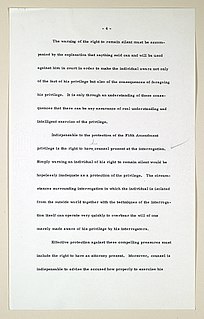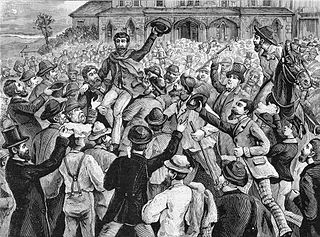Double jeopardy, non bis in idem or ne bis in idem is a procedural defence that prevents an accused person from being tried again on the same charges following a valid acquittal or conviction in the same jurisdiction.

In the United States, the Miranda warning is a type of notification customarily given by police to criminal suspects in police custody advising them of their right to silence; that is, their right to refuse to answer questions or provide information to law enforcement or other officials. These rights are often referred to as Mirandarights. The purpose of such notification is to preserve the admissibility of their statements made during custodial interrogation in later criminal proceedings.
Nolo contendere is a legal term that comes from the Latin phrase for "I do not wish to contend". It is also referred to as a plea of no contest.
A statute of limitations, known in civil law systems as a prescriptive period, is a law passed by a legislative body to set the maximum time after an event within which legal proceedings may be initiated.
Defamation is the oral or written communication of a false statement about another that unjustly harms their reputation and usually constitutes a tort or crime. In several countries, including South Korea, a true statement can also be considered defamation.
Criminal procedure is the adjudication process of the criminal law. While criminal procedure differs dramatically by jurisdiction, the process generally begins with a formal criminal charge with the person on trial either being free on bail or incarcerated, and results in the conviction or acquittal of the defendant. Criminal procedure can be either in form of inquisitorial or adversarial criminal procedure.
Entrapment is a practice whereby a law enforcement agent or agent of the state induces a person to commit a "crime" that the person would have otherwise been unlikely or unwilling to commit. It "is the conception and planning of an offense by an officer or agent, and the procurement of its commission by one who would not have perpetrated it except for the trickery, persuasion or fraud of the officer or state agent."

In common law jurisdictions, an acquittal certifies that the accused is free from the charge of an offense, as far as the criminal law is concerned. The finality of an acquittal is dependent on the jurisdiction. In some countries, such as the United States, an acquittal operates to bar the retrial of the accused for the same offense, even if new evidence surfaces that further implicates the accused. The effect of an acquittal on criminal proceedings is the same whether it results from a jury verdict or results from the operation of some other rule that discharges the accused. In other countries, the prosecuting authority may appeal an acquittal similar to how a defendant may appeal a conviction.
Skinner v. State of Oklahoma, ex rel. Williamson, 316 U.S. 535 (1942), was the United States Supreme Court ruling that held that laws permitting the compulsory sterilization of criminals are unconstitutional if the sterilization law treats similar crimes differently. The relevant Oklahoma law applied to "habitual criminals," but the law excluded white-collar crimes from carrying sterilization penalties. The Court held that treating similar crimes differently violated the Equal Protection Clause of the 14th Amendment.
In the United States, the exclusionary rule is a legal rule, based on constitutional law, that prevents evidence collected or analyzed in violation of the defendant's constitutional rights from being used in a court of law. This may be considered an example of a prophylactic rule formulated by the judiciary in order to protect a constitutional right. The exclusionary rule may also, in some circumstances at least, be considered to follow directly from the constitutional language, such as the Fifth Amendment's command that no person "shall be compelled in any criminal case to be a witness against himself" and that no person "shall be deprived of life, liberty or property without due process of law."
In criminal law, a conspiracy is an agreement between two or more persons to commit a crime at some time in the future. Criminal law in some countries or for some conspiracies may require that at least one overt act be undertaken in furtherance of that agreement, to constitute an offense. There is no limit on the number participating in the conspiracy and, in most countries, no requirement that any steps have been taken to put the plan into effect. For the purposes of concurrence, the actus reus is a continuing one and parties may join the plot later and incur joint liability and conspiracy can be charged where the co-conspirators have been acquitted or cannot be traced. Finally, repentance by one or more parties does not affect liability but may reduce their sentence.

A threat is a communicated intent to inflict harm or loss on another person. Intimidation is widely observed in animal behavior chiefly in order to avoid the unnecessary physical violence that can lead to physical damage or the death of both conflicting parties. A threat is considered an act of coercion.

The Fifth Amendment to the United States Constitution addresses criminal procedure and other aspects of the Constitution. It was ratified in 1791 as part of the Bill of Rights. The Fifth Amendment applies to every level of the government, including the federal, state, and local levels, as well as any corporation, private enterprise, group, or individual, or any foreign government in regard to a US citizen or resident of the US. The Supreme Court furthered the protections of this amendment through the Due Process Clause of the Fourteenth Amendment.

At common law, criminal conversation, often abbreviated as crim. con., is a tort arising from adultery. "Conversation" is an old euphemism for sexual intercourse that is obsolete except as part of this term.
Stoner v. California, 376 U.S. 483 (1964), is a United States Supreme Court decision involving the Fourth Amendment. It was a criminal case appealed from the California Courts of Appeal after the California Supreme Court denied review. The case extended the situations under which search warrants are required as they reversed a robbery conviction made on the basis of evidence obtained in violation of the holding.
The Assistance of Counsel Clause of the Sixth Amendment to the United States Constitution provides: "In all criminal prosecutions, the accused shall enjoy the right...to have the Assistance of Counsel for his defence."
Glasser v. United States, 315 U.S. 60 (1942), was a landmark decision of the US Supreme Court on two issues of constitutional criminal procedure. Glasser was the first Supreme Court decision to hold that the Assistance of Counsel Clause of the Sixth Amendment required the reversal of a criminal defendant's conviction if his lawyer's representation of him was limited by a conflict of interest.

The Marshall Court (1801–1835) heard forty-one criminal law cases, slightly more than one per year. Among such cases are United States v. Simms (1803), United States v. More (1805), Ex parte Bollman (1807), United States v. Hudson (1812), Cohens v. Virginia (1821), United States v. Perez (1824), Worcester v. Georgia (1832), and United States v. Wilson (1833).
Ramos v. Louisiana, 590 U.S. ___ (2020), is a landmark United States Supreme Court case in which the Court ruled 6–3 that the Sixth Amendment to the United States Constitution requires that guilty verdicts for criminal trials be unanimous. Only cases in Oregon and Louisiana were affected by the ruling, because every other state already had this requirement. The decision incorporated the Sixth Amendment requirement for unanimous jury criminal convictions against the states, and thereby overturned the Court's previous decision from the 1972 case Apodaca v. Oregon.





